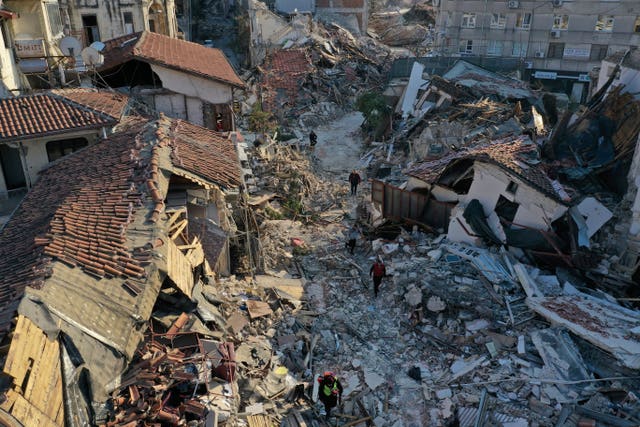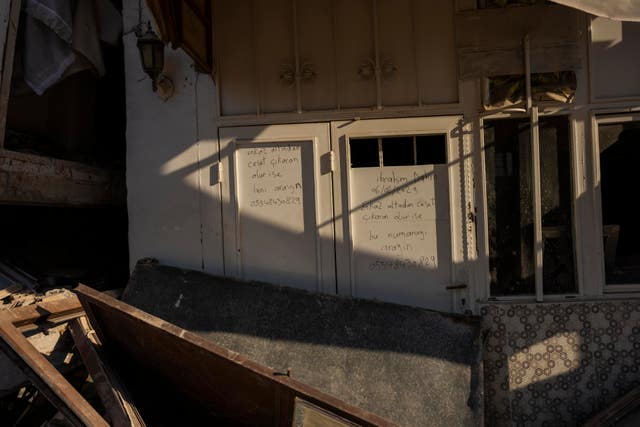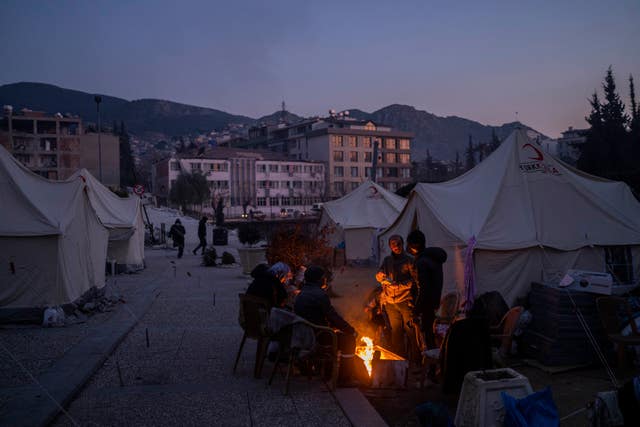The search for earthquake survivors in Turkey and Syria entered its final hours on Monday as rescuers using sniffer dogs and thermal cameras surveyed collapsed apartment blocks for any sign of life a week after the disaster.
Teams in southern Turkey’s Hatay province cheered and clapped when a 13-year-old boy identified only by his first name, Kaan, was pulled from the rubble.
In Gaziantep province, rescue workers, including coal miners who secured tunnels with wooden supports, found a woman alive in the wreckage of a five-storey building.
Stories of such rescues have flooded the airwaves in recent days. But experts say the window for rescues has nearly closed, given the length of time that has passed, the fact that temperatures have fallen to minus 6C and the severity of the building collapses.
In some areas, searchers placed signs that read “ses yok”, or “no sound”, in front of buildings they had inspected for any sign that someone was alive inside, HaberTurk television reported.
Associated Press journalists in Adiyaman saw a sign painted on a concrete slab in front of wreckage indicating that an expert had inspected it.
In Antakya, people left signs displaying their phone numbers and asking crews to contact them if they found any bodies in the rubble.
The quake’s financial damage in Turkey alone was estimated at 84.1 billion US dollars (£69.3 billion), according to the Turkish Enterprise and Business Confederation, a non-governmental business organisation. Calculated using a statistical comparison with a similarly devastating 1999 quake, the figure was considerably higher than any official estimates so far.
As the UN works to provide assistance to survivors of the devastating earthquake in northwest Syria, @antonioguterres welcomes decision that will allow two additional humanitarian crossing points to be opened up along the border with Türkiye. https://t.co/dKVDkUetRU
— United Nations (@UN) February 13, 2023
In other developments, Syria’s president agreed to open two new crossing points from Turkey to the country’s rebel-held northwest to deliver desperately needed aid and equipment for millions of earthquake victims, the United Nations announced.
UN secretary-general Antonio Guterres welcomed the decision by Syrian leader Bashar Assad to open crossing points at Bab Al-Salam and Al Raee for an initial period of three months.
Currently, the UN has only been allowed to deliver aid to the northwest Idlib area through a single crossing at Bab Al-Hawa.
Some 62 miles from the epicentre, almost no houses were left standing in the village of Polat, where residents salvaged refrigerators, washing machines and other goods from wrecked homes.
Not enough tents have arrived for the homeless, forcing families to share the tents that are available, survivor Zehra Kurukafa said.
“We sleep in the mud, all together with two, three, even four families,” she said.

In the city of Adiyaman, Musa Bozkurt waited for a vehicle to bring him and others to western Turkey.
“We’re going away, but we have no idea what will happen when we get there,” said the 25-year-old.
“We have no goal. Even if there was (a plan), what good will it be after this hour? I no longer have my father or my uncle. What do I have left?”
Fuat Ekinci, a 55-year-old farmer, was reluctant to leave his home for western Turkey, saying he did not have the means to live elsewhere and that his fields need to be tended.
“Those who have the means are leaving, but we’re poor,” he said. “The government says, go and live there a month or two. How do I leave my home? My fields are here, this is my home, how do I leave it behind?”

The widespread damage included heritage sites in places such as Antakya, on the southern coast of Turkey, an important ancient port and early centre of Christianity historically known as Antioch.
Greek Orthodox churches in the region have started charity drives to assist the relief effort and raise funds to rebuild or repair churches.
In Syria, authorities said a newborn whose mother gave birth while trapped under the rubble of their home was doing well. The baby, Aya, was found hours after the quake, still connected by the umbilical cord to her mother, who was dead.
Such accounts have given many hope, but Eduardo Reinoso Angulo, a professor at the Institute of Engineering at the National Autonomous University of Mexico, said the likelihood of finding people alive was “very, very small now”.

Turkey’s death toll has exceeded 31,000, and the health minister said more than 19,000 survivors were being treated in hospitals.
Deaths in Syria, split between rebel-held areas and government-held areas, have risen beyond 3,500, although those reported by the government have not been updated in days.
UN spokesman Stephane Dujarric said UN humanitarian chief Martin Griffiths met on Monday with Syria’s President Bashar Assad and foreign minister after visiting Aleppo and seeing the devastating damage there.
He stressed that the United Nations does not have heavy equipment for excavations or search-and-rescue efforts “so the international community as a whole needs to step up to get that aid where it’s needed”.
In addition, the UN’s humanitarian partners need ambulances, medicine, shelters, heaters and emergency food, water and sanitation and hygiene items, Mr Dujarric said.






